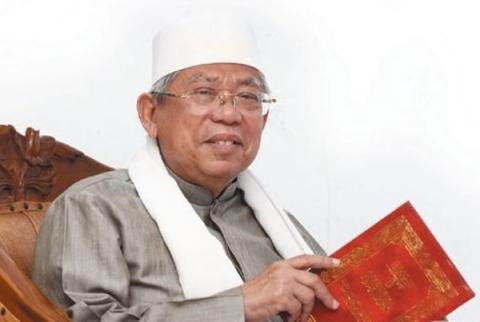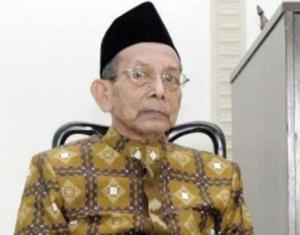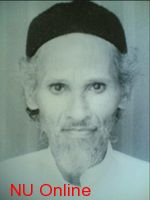The Youngest SI Hijaz Board
NU Online · Selasa, 13 Januari 2009 | 01:14 WIB
However, not all the names involved in every important event become important names which always being chanted by the public hereafter. Behind the establishment of Nahdlatul Ulama (NU), there were prominent names that later became legendary and memorized until some generations. But, of course, there were names who played important role in the process of NU establishment and still became low-profile and populist names. They remain the names who did not make them apart from their birthplace. One of the names still got closed with people, still a name of ordinary person, was KH. Abdul Chalim bin Kedung, Leuwimunding Majalengka.<>
This ulema, born in 1898, was a part of momentous history. But it did not make him apart far from the ordinary people. Even though his name was recorded in several important events, KH. Abdul Chalim remained being memorized as a part of ordinary people.
The Significance of Social and Moderate Solidarity
It was because KH. Abdul Chalim applied the social solidarity principles in his entire life, then such solidarity (ashobiyyah) was also taught to his students (santri). The solidarity practiced by KH. Abdul Chalim prevailed in both small groups and big communities. According to KH. Abdul Chalim, solidarity was so significant in tightening the relationship among religious or political communities. The purpose of religious movement was impossible to achieve without political solidarity.
The solidarity principles also have to be applied all the time since solidarity is one barometer of ibadah balance. When Ibadah is correctly practiced according to syara’ stipulation, it may bring us closer to Allah. However, in order not to be misled by understanding ibadah in a narrow way, i.e. merely ritual, we should make a balancing. According to KH. Abdul Chalim, this balancing can be done by always growing solidarity among Moslems.
The solidarity itself might be political or social one. Political solidarity means collective solidarity of Moslems to achieve national purposes. While social solidarity is the togetherness of Moslems in creating harmony in our daily life. Therefore, Islamic life is not monotonous; not viewing the value of ibadah merely from the side of mahdah (physical) ritual ibadah. But the complete will and effort to build the harmonious life in accordance with syariah principles is also a form of ibadah to Allah SWT.
According to KH. Abdul Chalim, total submission and tawakkal to Allah SWT was also the thing that he and his family as well as students practiced. However, KH. Abdul Chalim also prioritized to compromise in getting agreement through musyawarah (discussion).
The opennness of KH. Abdul Chalim can hardly be detached from the influence of his beloved teacher, KH. Wahab Hasbullah Jombang. During his study time with KH. Wahab Hasbullah, Abdul Chalim had served his life for the sake of knowledge development in santri world. Nahdlatul Wathan became the correct place for Abdul Chalim to learn and disseminate his scientific understanding.
The scientific approach toward society by religious social interaction in Nahdlatul Wathan was one of KH. Abdul Chalim’s contributions. For him, the social approach toward society to apply syariat scientific norms for the social life was an urgent breakthrough in disseminating the down-to-earth Islamic concepts.
The physical struggle situation at that time enabled the concepts offered by KH. Abdul Chalim accepted by his partners in Nahdlatul Wathan. The concepts he meant as a social approach was by making comparative analogies between the conditions described in kitab kuning (lit: Yellow Books, means a book about life in accordance with Islam) and the real life experienced by the people in this nation on that era. It means by realizing the establishment of an independent state that could accommodate the entire citizens under the agreed regulations.
Therefore, in KH. Abdul Chalim’s view, the people’s solidarity could last after colonialism was out of this country. He got his opinions about the solidarity of Moslem society, especially in this Dutch Indies colonized land, from his experience while studying to ulemas, from his birth land to the other regions in West Java or East Java. The Pesantren (Islamic Boarding School) of Trajaya in Majalengka, Kedungwuni in kadipaten and Kempek in Cirebon were the places where Abdul Chalim studied in his young age.
Reconciling the Conflicts among Seniors
In 1914, when he was only sixteen years old, Abdul Chalim got the chance to practice hajj and studied in Hijaz land. There, Abdul Chalim studied directly from Abu Abdul Mu’thi, Muhammad Nawawi bin Umar al-Bantani, who was more popular as Imam Nawawi al-Bantani.
During his study in Hijaz land, KH. Abdul Chalim met several national ulemas from different regions. From there, these ulemas then became his friends and teachers. One of the most intimate friends as well as teachers, was KH. Wahab Hasbullah Jombang. At that time, Abdul Chalim became a member and board of Sarekat Islam (SI), the youngest in Hijaz. SI was an organization of Indonesian ulema who concentrated on opposing the Dutch Indies colonizer’s policies in the country. Through SI, the colonizer’s policies which were not in accordance with Islam syariat and marginalized the people, were constitutionally rejected. Until his turn came, SI ulemas then integrated themselves to NU after this organization was founded in 1926.
While studying in Mecca, KH. Abdul Chalim had shown his moderate and compromising characteristic as a wise ulema. It was him who reconcile KH. Wahab Hasbullah Jombang and KHR Asnawi Kudus when they had a dispute in Hijaz. At that time, These two ulema were the senior and teacher of KH. Abdul Chalim. Meanwhile, Abdul Chalim was submissive when KH. Wahab Hasbullah reminded him because he always sang Sundanese songs when they repeated their lessons.
His status as a single son of a kuwu (village administrative official in charge of water) made KH. Abdul Chalim did not feel awkward when he was involved in SI Hijaz board. And also when he had come back to his fatherland in 1917.
After his coming back from the Holy Land, KH. Abdul Chalim helped his parents in the village to release their burdens due to the Dutch Colonialism, which became meaner and meaner day by day.
Abdul Chalim married four women. In the age of 21, he married a girl from Petalangan, Kuningan as his first wife. Three years later, he married Siti Noor, a girl from pasir Muncang Majalengka. In his journey to make a living in Jakarta, as a storekeeper and laborer in railway station –although he was a son of kuwu- Abdul Chalim spent his time to teach religion to the children in Kramat jati Jakarta. During this time of working and giving religious teachings in Kramat Jati, he was accompanied by his second wife, Siti Noor from Majalengka.
KH. Abdul Chalim married his fourth wife in the middle of his struggle in fighting against the Dutch colonizer when Surabaya war happened and Jihad resolution reverberated. His third wife was Madam Sidik Shindanghaji from Leuwimunding. Before that, he had married Madam Konaah as his third wife.
In 1921, because his father passed away, KH. Abdul Chalim came back to Majalengka and brought his first wife from Petalangan to Leuwimunding. And he had divorced his second wife. But, due to the unstable situation, Abdul Chalim brought his wife back to Petalangan for the sake of safety. Then, Abdul Chalim himself served his entire life for the movement and education world.
Introducing Aswaja till the Lowest Level
Abdul Chalim traveled to Surabaya to follow his colleagues afterwards. There, thanks to Kyai Amin Peraban, Abdul Chalim met his senior and teacher in Hijaz, KH. Wahab Hasbullah again. Because of their good relationship, KH. Wahab Hasbullah trusted him to be a teacher in Nahdlatul Wathan in Kampong Kawatan VI Surabaya. Besides teaching, Kh. Abdul Chalim also got the trust to manage the administration and became the initiator of teaching and learning activities as well as conducting discussion forums.
As a Sundanese santri who was skillful at singing and mastered Balaghoh (Old Arabic Literature), Kh. Abdul Chalim had written lots of Arabic poetry to trigger the fighting spirit of the santri united in Nahdlatul Wathan.
The friendship between KH. Abdul Chalim and KH. Wahab Hasbullah enabled him to become a loyal follower and an assistant to KH. Wahab Hasbullah. Through his activities in Nahdlatul Wathan, he applied his religious ideas about social interaction and political and national solidarity in society. Besides Nahdlatul Wathan, he was also recorded as a teacher in tashwirul Afkar Surabaya.
While serving in Surabaya, for many times KH. Abdul Chalim went home to Majalengka to announce the latest news from Surabaya in which at that time was the struggling center of santri in liberating the nation from the fetter of colonialism and the ummah foolishness. Every time he went home to Majalengka, KH. Abdul Chalim always came to every single home to teach and introduce Ahlussunnah Waljamaah concept. He always disseminated pictures and newspapers “Swara Nahdlatoel Oelama” to the people in Majalengka and its surroundings.
In 1942, when Japanese Colonizer government froze Islamic organizations, KH. Abdul Chalim faced two big challenges in his region. Japan’s intervention to the youths to join Japanese military forces and the pride of youth to be communist were big dilemmas that were not easy to face.
In such situation, KH. Abdul Chalim formed Hizbullah Majalengka branch along with KH. Abbas (Buntet, Cirebon). Hizbullah Majalengka afterwards side by side together with other fighter groups, with both santri and other youth paramilitary forces, endured the freedom of Indonesia.
In 1955, KH. Abdul Chalim became a House of Representative member from NU Party from West Java. Since that time, his struggle more focused on empowering members of the West Java NU by establishing several social empowerment forums like PERTANU (Perkumpulan Petani NU / NU Farmer Association), PERGUNU (Perkumpulan Guru NU / NU Teacher Association) and some other NU educational institutions in West Java.
One day, on April 11 1972, after having prayer KH Abdul Chalim faced his Creator peacefully and was laid in Sabilul Chalim leuwimunding, Majalengka Pesantren (Islamic Boarding School).
(Taken and summarized by Syaifullah Amin from a book entitled KH Abdul Chalim Kenapa Harus Dilupakan?, written by J. Fikri Mubarok)
Terpopuler
1
Kemenag Tetapkan Gelar Akademik Baru untuk Lulusan Ma’had Aly
2
LKKNU Jakarta Perkuat Kesehatan Mental Keluarga
3
Mahasiswa Gelar Aksi Indonesia Cemas, Menyoal Politisasi Sejarah hingga RUU Perampasan Aset
4
3 Alasan Bulan Kedua Hijriah Dinamakan Safar
5
Anggapan Safar sebagai Bulan Sial Berseberangan dengan Pandangan Ulama
6
Kopri PB PMII Luncurkan Beasiswa Pendidikan Khusus Profesi Advokat untuk 2.000 Kader Perempuan
Terkini
Lihat Semua















